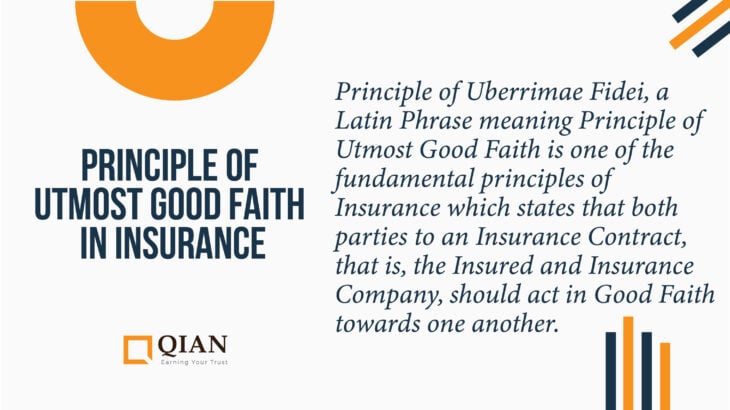Principle of Utmost Good Faith
Principle of Uberrimae Fidei, a Latin Phrase meaning Principle of Utmost Good Faith is one of the fundamental principles of Insurance which states that both parties to an Insurance Contract, that is, the Insured and Insurance Company, should act in Good Faith towards one another.
Duty of Utmost Good Faith for the Insured
Under the Principle of Utmost Good Faith, it is necessary for the Insured to disclose all Material Facts to the Insurance Company. A Material Fact is one which affects the decision of the underwriter to accept the risk or not, decide Insurance Premium Rates and the terms and conditions of the Policy.
The duty of good faith in Insurance is valid at every stage of the Insurance Process and a breach of the duty of Utmost Good Faith is a breach of Contractual Duty. This arises because the Insured has more knowledge about the subject matter than the Insurance Company and thus the Insurance Company is in a vulnerable position as regards to the subject matter to be Insured.
Thus, it is the Insured’s duty to inform the Insurance Company of all Material Facts so that the company is fully aware of the risks and can offer a suitable cover by charging appropriate premium.
What happens if the Principle of Utmost Good Faith is breached by the Insured?
If the Principle of Utmost Good Faith is breached, the Insurance Company can reject the proposal.
The Principle of Utmost Good Faith can be breached in 2 ways:
Non-Disclosure of Material Facts
Not disclosing Material Facts means that the Insurance Company cannot make an informed decision whether to accept the risk or not. This means that the risk accepted by the Insurance Company is different from what it would have been had all the material facts been disclosed. If the Insurance Company comes to know about the withheld information, it can cancel the Insurance Policy.
Example of Non-Disclosure of Material Facts
Mr Ramesh had purchased a Term Life Insurance Policy. However, he did not disclose his smoking and drinking habit while purchasing the Policy. Mr Ramesh withheld material information which, if disclosed, would have resulted in a higher premium.
Upon finding out, the Insurance Company cancelled the policy.
Misrepresentation of Material Facts
Misrepresentation means Giving Wrong Information which also breaches the Principle of Utmost Good Faith. This may also lead to Policy Cancellation.
Example of Misrepresentation of Material Facts
Mr Ajay had purchased a Fire Insurance Policy where he gave wrong information about the risk occupancy in order to obtain a lower premium. Upon finding out, the Insurance Company cancelled the policy.
Duty of Utmost Good Faith for the Insurance Company
Just as the Insured has a duty of disclosing all material facts to the Insurance Company, the Insurance Company also has a duty of Utmost Good Faith to the Insured.
The Insurance Company has superior knowledge about the terms and conditions of the Insurance Policy. It is the duty of the Insurance Company to inform the Insured of the same and a failure to do so constitutes Breach of Duty of Utmost Good Faith by the Insurance Company.
Thus, Insurance Company must provide the Insured with a prospectus of the Insurance Policy before purchase, which explains the coverages, terms and conditions of the Policy.
With regards to an Insurance Claim, the Insurance Company is duty bound to approach the investigation and settlement of the claim in a fair and just manner. If the Insurance Company does not act fairly in claim settlement, it also constitutes a breach of duty of good faith.
When is the Duty of Utmost Good Faith required in Insurance?
The Duty of Utmost Good Faith is required at all stages of an Insurance Policy. It is the duty of the Insured to keep the Insurance Company appraised of any change in the risk profile of the subject matter.
Consider an example where Mr ABC has purchased a Factory and Warehouse Insurance Policy. He stores non-hazardous stocks in the warehouse. Now, Mr ABC starts manufacturing a new product which requires a hazardous raw material. If this hazardous raw material is stored in the warehouse, the same should be promptly communicated to the Insurance Company and additional premium for the change in risk occupancy should be paid.
At every renewal, the Insured should intimate the Insurance Company of any change in risk profile and value of the subject matter to be insured.
Conclusion
The Principle of Utmost Good Faith is one of the fundamental principles of Insurance and it ensures that, both the Insurance Company and the Insured have adequate information before making a decision about the Insurance Policy.
Qian helps businesses get the best insurance coverages and compare insurance quotes amongst various insurance companies. If you have any questions regarding Insurance, you can reach out to us at insurance@qian.co.in or call us on 022-22044989.
We would be glad to assist you!

